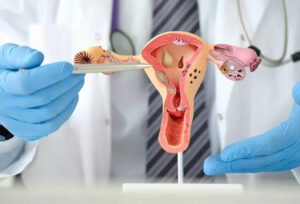Polycystic Ovary Syndrome (PCOS) is a common hormonal disorder affecting individuals of reproductive age, and its management often requires a multifaceted approach. While lifestyle changes and medications play a crucial role, some cases may benefit from surgical interventions. In this comprehensive guide, we’ll explore the PCOS surgical treatment options, shedding light on the procedures, benefits, and considerations involved.
Contents
Can PCOS Be Treated By Surgery?
 Yes, surgical intervention can be a treatment option for certain cases of Polycystic Ovary Syndrome (PCOS). One common surgical procedure is Laparoscopic Ovarian Drilling (LOD), a minimally invasive technique. This procedure is typically considered when lifestyle changes and medications have not effectively addressed the symptoms of PCOS, particularly in cases where infertility is a concern.
Yes, surgical intervention can be a treatment option for certain cases of Polycystic Ovary Syndrome (PCOS). One common surgical procedure is Laparoscopic Ovarian Drilling (LOD), a minimally invasive technique. This procedure is typically considered when lifestyle changes and medications have not effectively addressed the symptoms of PCOS, particularly in cases where infertility is a concern.
It’s important to note that surgery is not a one-size-fits-all solution for PCOS, and its appropriateness depends on individual factors, such as the severity of symptoms, fertility goals, and response to other treatment modalities. Surgical options like LOD are generally reserved for specific situations. Hence, consultation with a healthcare professional is crucial to determine the most suitable course of action based on an individual’s unique circumstances.
When Should I Consider PCOS Surgical Treatment?
Consideration of PCOS surgical treatment, such as Laparoscopic Ovarian Drilling (LOD) or other procedures, is typically reserved for specific situations when other conservative approaches have not yielded satisfactory results. Here are some scenarios in which you might contemplate PCOS surgical treatment:
- Failure of Conservative Treatments: If lifestyle changes, dietary modifications, and medications have not effectively managed your PCOS symptoms, especially in cases where irregular menstrual cycles and fertility issues persist, surgical intervention may be considered.
- Infertility Concerns: If you are struggling with infertility due to PCOS and have not achieved success with fertility medications or assisted reproductive technologies. Then, your healthcare provider may discuss surgical options to enhance your chances of ovulation and conception.
- Severe PCOS Symptoms: In cases of severe PCOS symptoms, such as persistent pain, ovarian cysts, or other complications, surgery might be considered to address these specific issues. And alleviate symptoms that significantly impact your quality of life.
- Androgen Excess: If elevated androgen (male hormone) levels are a primary concern and contribute to symptoms like hirsutism (excessive hair growth) or acne, surgical procedures may be considered to directly address and reduce ovarian androgen production.
It’s essential to consult with a healthcare professional specializing in reproductive endocrinology or gynecology to assess your case, discuss treatment options, and determine the most appropriate course of action based on your specific needs and goals. Surgery is generally considered when other avenues have been explored and deemed insufficient in addressing the challenges posed by PCOS.
What Are Some PCOS Surgical Treatment Options?
 Several surgical treatment options may be considered for individuals with Polycystic Ovary Syndrome (PCOS), particularly when conservative measures prove insufficient. Here are some common PCOS surgical treatment options:
Several surgical treatment options may be considered for individuals with Polycystic Ovary Syndrome (PCOS), particularly when conservative measures prove insufficient. Here are some common PCOS surgical treatment options:
Laparoscopic Ovarian Drilling (LOD)
Laparoscopic Ovarian Drilling is a minimally invasive surgical technique designed to address hormonal imbalances and promote regular ovulation in individuals with PCOS. In this procedure, a surgeon makes small incisions in the abdominal wall through which a laparoscope is inserted—a thin, lighted tube with a camera. The surgeon then uses a laser or heat to puncture small areas of the ovarian surface. This process aims to disrupt the ovarian tissue, specifically targeting the areas responsible for excess androgen production.
By reducing androgen levels, LOD helps restore hormonal balance, regulate menstrual cycles, and improve fertility. Unlike more extensive surgical interventions, LOD is associated with a shorter recovery time and lower risk of complications. This makes it a preferred option for many individuals with PCOS seeking to enhance their chances of conception.
Ovarian Wedge Resection
Ovarian wedge resection, once a common surgical procedure for PCOS, involves the removal of a small wedge-shaped piece from the outer layer of the ovary. This surgical approach aims to decrease androgen production and induce regular ovulation. However, advancements in minimally invasive techniques, such as LOD, have led to a decline in the use of ovarian wedge resection due to its associated risks and comparable success rates with less invasive options. The procedure is now considered more invasive and is generally reserved for specific cases where alternative treatments have proven ineffective.
In Vitro Fertilization (IVF)
In vitro fertilization is an assisted reproductive technology that is not a direct surgical procedure but plays a crucial role in PCOS management, especially when infertility is a primary concern. IVF involves stimulating the ovaries to produce multiple eggs, retrieving those eggs, fertilizing them in a laboratory setting, and then transferring the resulting embryos into the uterus. This approach is often considered when other treatments have not led to successful pregnancies.
IVF allows for better control over the reproductive process and can be particularly beneficial for individuals with PCOS who may experience irregular ovulation. It is a comprehensive and effective option for those seeking to overcome infertility challenges associated with PCOS.
It’s important to note that surgical interventions for PCOS are generally considered in specific situations and are not the first-line approach. The decision to pursue surgery should be made in consultation with a healthcare professional. The choice of surgical procedure depends on the specific circumstances of each case.
What Are The Benefits You Can Expect?
 The benefits of PCOS surgical treatments can vary depending on individual circumstances. Here are some potential benefits associated with these interventions:
The benefits of PCOS surgical treatments can vary depending on individual circumstances. Here are some potential benefits associated with these interventions:
- Improved Ovulation and Menstrual Regularity
One of the primary goals of PCOS surgical treatments is to induce regular ovulation, leading to more predictable menstrual cycles. LOD, in particular, aims to disrupt the ovarian tissue responsible for irregular hormone production.
- Enhanced Fertility
For individuals struggling with infertility due to PCOS, surgical interventions can offer increased chances of conception. By addressing underlying hormonal imbalances and promoting regular ovulation, these procedures create a more favorable environment for natural conception.
- Reduction of Androgen Levels
Surgical treatments target the areas of the ovaries responsible for excess androgen production. By reducing androgen levels, these procedures can alleviate symptoms associated with hyperandrogenism leading to an improvement in the overall quality of life.
- Minimally Invasive Approaches and Shorter Recovery Times
Minimally invasive techniques like LOD are associated with smaller incisions, less postoperative pain, and shorter recovery times compared to more traditional surgical methods. This allows individuals to resume their normal activities more quickly and with fewer complications.
- Alternative to Prolonged Medication Use
For individuals who may not respond well to long-term medication use or experience side effects, surgical interventions can provide an alternative approach to managing PCOS symptoms. This can be particularly relevant for those who prefer a more definitive solution to their reproductive health challenges.
It’s important to note that the benefits of PCOS surgical treatments should be carefully weighed against potential risks and individual health considerations. Additionally, the success of these interventions can vary from person to person. Thus, consultation with a healthcare professional is crucial for personalized advice and guidance based on specific needs and goals.
Can PCOS Be Cured Permanently?
Polycystic Ovary Syndrome (PCOS) is a chronic condition that currently does not have a cure. However, effective management strategies are available to help control and alleviate its symptoms. Lifestyle modifications, including a balanced diet, regular exercise, and maintaining a healthy weight, play a crucial role in managing PCOS. Additionally, medications may be prescribed to address specific symptoms. While these interventions can effectively manage PCOS symptoms, they do not provide a permanent cure.
Individuals with PCOS need to work closely with healthcare professionals to develop a personalized treatment plan that addresses their unique symptoms and concerns. Regular monitoring, adjustments to the treatment plan as needed, and a holistic approach that considers both the reproductive and metabolic aspects of PCOS contribute to effective long-term management. While there may not be a cure for PCOS, with proper care and lifestyle adjustments. Still, individuals can lead healthy and fulfilling lives while minimizing the impact of PCOS on their overall well-being.
Conclusion
In conclusion, managing Polycystic Ovary Syndrome (PCOS) involves a multifaceted approach, with PCOS surgical treatments like Laparoscopic Ovarian Drilling (LOD) and other interventions playing a role in specific cases. While these procedures offer potential benefits, it’s crucial to recognize that PCOS doesn’t have a permanent cure. Rather, effective management relies on a combination of lifestyle changes, medications, and, in certain situations, surgical options.
Each individual’s journey with PCOS is unique. Therefore, consulting with healthcare professionals for personalized guidance is essential. By embracing a holistic approach that addresses both the reproductive and metabolic aspects of PCOS, individuals can navigate this condition, leading fulfilling lives with minimized impact on their overall well-being. If you are facing PCOS-related issues, PCOS treatment at HerMantra can help. Book your free trial online pcos treatment session now.


